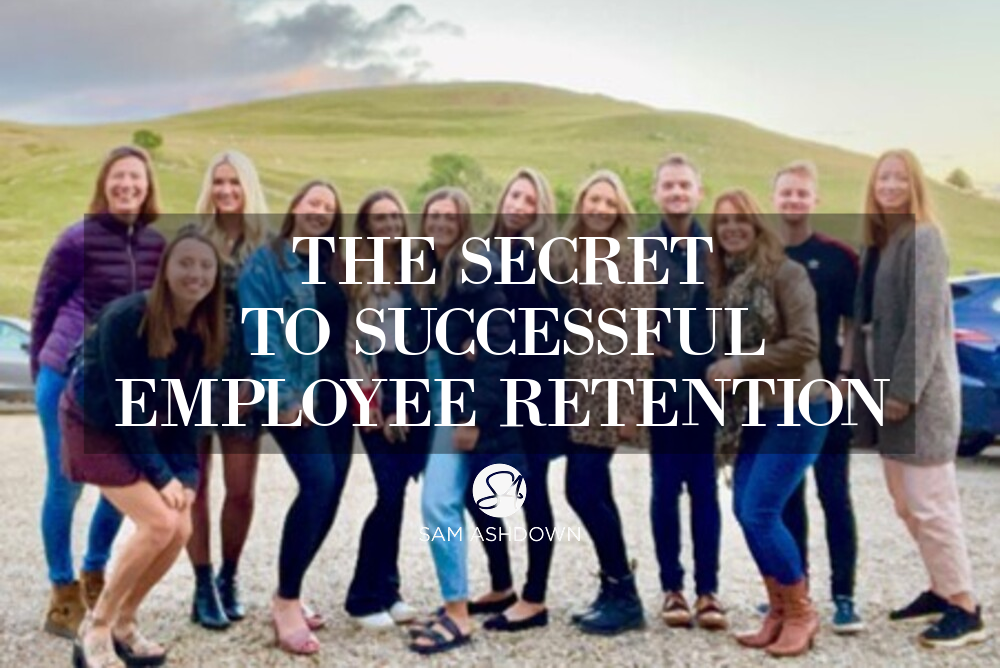The secret to successful retention is not actually a secret at all. It’s to keep your team happy.
All of them.
You can’t make one team member happy at the expense of the happiness of the others, so to make everyone happy at the same time involves quite a bit of elaborate and tricky plate spinning. Someone once told me that a mother is “only as happy as her unhappiest child”. That is certainly true, and it’s also true of a team. As the leader, you’re only as happy as your unhappiest employee.
Having a happy crew starts with making sure everyone is in the right roles. In the book Traction, Gino Wickman talks about having “the right people in the right seats”. But this is a constantly moving goal post. Just because someone came into your company as an enthusiastic and wildly appreciative Team Executive Assistant, doesn’t mean they still feel the same way about their job after a year or two. You need to review everyone’s seats and happiness levels, all of the time.
And if that sounds like hard work, it’s because it is. There are no shortcuts to making sure your team is always as happy as possible, but there are toolkits and systems you can use to help you on this often-arduous task. I’m writing a book on these right now, in fact. (If you want to get on the early notification list when it’s published, drop me an email here.)
The ‘Five Love Languages’
Have you heard of the ‘Five Love Languages’? Created by Gary Chapman in his 1992 book,
“The Five Love Languages: How to Express Heartfelt Commitment to Your Mate”, these are five ways that romantic partners “express and experience love” . (Also check out Chapman’s book https://www.5lovelanguages.com/book/the-5-languages-of-appreciation-in-the-workplace/ )
The ‘Five Love Languages’ are:
1. Acts of service
2. Gift-giving,
3. Physical touch,
4. Quality time, and
5. Words of affirmation.
What on earth do these love languages have to do with employee retention? Forget the word ‘love’, and replace it in your mind with ‘appreciation’. Here’s why knowing these five ways of showing appreciation is important to you, as an employer: because not everyone receives positive feedback in the same way. If you treat all your employees the same, you’ll get completely different reactions from your team, depending on which ‘love language’ they prefer.

Taking our team to a local Arts and Crafts house for a tour
In a very non-scientific survey (I asked my family and our team), here are the results I got from my very small sample of just 30 people, when I asked them which ‘love language’ they prefer:
1. Acts of service – 21%
2. Gift-giving – 0%
3. Physical touch – 16%
4. Quality time – 68%
5. Words of affirmation 16%
As you can see, the results are radically different, and if your praise and appreciation seem to be missing the mark and leaving you frustrated, the answer may lie in the fact that you’re speaking a different language to your employees.
You may be giving verbal praise, “You did a great job today with that client, thank you,” (words of affirmation) when what they want is some time off (gift-giving) to compensate for the extra time they put in. Or you make a cuppa (act of service) for a team member that seems a bit overwhelmed with everything they need to do, but they’d rather have a hug (physical touch).
How do you know which love language you prefer? Look at the five now – do any of them especially resonate with you? What’s your first instinct? What made you feel appreciated as a child?
What we as employers need, is a way to show our appreciation to our team, but because we naturally gravitate to the ‘Love Language’ we ourselves prefer, this is the one we use as a go-to, regardless of whether that’s how that person receives praise or appreciation.

Maria, Bex and Teddy celebrating another great sale
What happens when we show appreciation to our employees?
They’re happier. They feel valued, they feel their job is worthwhile, they feel noticed and needed. They interact with each other and clients when they feel happier too, and are more likely to go above and beyond what’s needed in any particular situation. We all want a positive, happy workplace. Discovering which of the 5 Love Languages apply to each person is your shortcut to doing exactly that.
It’s also not as complicated as it seems.
Take me, for example. I prefer to receive appreciation by spending quality time with someone, and a hug is nice too. That’s Love Languages 4 and 3. But I can’t assume that my team want to spend quality time with me and get a hug whenever they do anything worth praising.
What I found surprising in my research is how no one (literally, not one) chose number 2 – gift-giving. And yet it tends to be the go-to for most people to use. Want to say thank you? Give a box of chocolates or a bottle of wine. Condolences? Flowers are the norm. Gift-giving is a natural reaction when you want to say something to someone.
Try this: survey your team. See what they prefer, then adapt your appreciation and praise to accommodate that. I’m not saying you should never give a gift, but perhaps it should be accompanied by taking them out for lunch (act of service) or an impromptu positive career chat (quality time), and make sure you tell them how much you appreciate what they did and thank them (words of appreciation).

One of our monthly team nights out
Retention is a deep and meaningful subject, and needs a more in-depth exploration than these 1,000 words can do justice to. But if you’re slightly more aware of your employees’ happiness levels, and what they need from you, then this article will have been useful to that extent, at least.
Retention, recruitment and rewards are the ‘three Rs’ we teach as part of the AJ Academy, available exclusively to our AJ Mastermind members. If you’d like a chat to see if AJ Mastermind is a good fit for you, just pop us an email, and one of our very happy team will be in touch.
Sam

What to do next: book on our next FREE ‘Behind the Scenes at AJ Day!
What to read next: Get Through More Doors with our AJ Marketing Plan
What to listen to next: The Ignite Podcast episode 77: How to motivate your employees through better leadership


